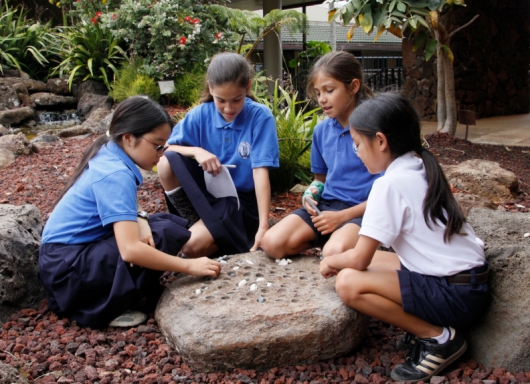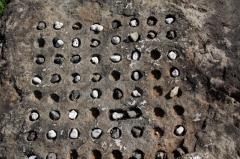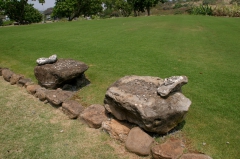Digital Collections
Celebrating the breadth and depth of Hawaiian knowledge. Amplifying Pacific voices of resiliency and hope. Recording the wisdom of past and present to help shape our future.
Ho‘okahua Staff
November 2014
When Makaliʻi, known as the constellation Pleiades, takes a certain position in the Hawaiian sky, it is a sign that Makahiki season is upon us. Makahiki—the beginning of the Hawaiian new year—begins in mid-November and ends in late January or February, aligning with the rainy season. It is a time set aside for tribute, harvest, sport, and play.
A favorite pastime during Makahiki season is engaging in games and competitions including ulu maika, moa paheʻe, ʻōʻō ihe. Not only are these games enjoyable, but they also showcase the physical skills of players.
Other traditional games like kōnane, or “Hawaiian checkers,” focus on mental acumen and strategy. Unfortunately, much of the depth and complexity of kōnane has been lost over the years.
Kōnane is played on a papa mū (stone board) with shallow holes set in rows and columns. Black and white ʻiliʻili (small stones) are used as playing pieces to jump over an opponent’s pieces to remove them from play.
There is an important distinction between kōnane and checkers. In checkers, the object of the game is to take out all of the opponent’s game pieces.
In kōnane, the object is to be the last one to make a move or have the option to make moves. The loser’s pieces may actually outnumber the victor’s, but if they are not in position to make a proper move and “kuʻi,” or take an opposing piece, then the game is over.
Accounts of kōnane in traditional Hawaiian literature and by foreigners reflect the belief that alternate versions of play existed, and these versions required the same kind of mental capacity that it would take to excel at chess.
For instance, in 1896, the first British sailors to witness a kōnane game compared it to “draughts,” the British name for checkers. Their observation reads: "One of their games resembles our game of draughts; but, from the number of squares, it seems to be much more intricate" (Cook and King 1784, 312).
The kōnane board they described had 14 rows by 17 rows, many more than our contemporary checkers and chess boards.
It is said that the Aliʻi Nui (High Chief) Kamehameha won a kōnane match with only one move. This is impossible by today’s rules.
A battle plan is sometimes referred to as a “papa kōnane,” so we can infer that the aliʻi might have set up battle formations on the papa mū and used the game to think through and play out battlefield strategy. In this context, a loss could represent holes in an aliʻi’s strategy, or worse, a potential loss on a battle field.
The Aliʻi Nui Kahekilinuiʻahumanu had a large papa mū outside of his hale (house). According to Stephen Desha, Sr., author of “Kamehameha and His Warrior Kekuhaupiʻo,” before every battle, Kahekili would gather his generals and without words, he would reveal his battle plan to them. Was he showing them what would happen in the battle by manipulating the pieces on the kōnane board?
So what can we learn from strategy games? Chess is largely about coordinating attacks to “check” and trap the opponents king. The aim of checkers is to eliminate all your opponent’s pieces.
Kōnane is about options—to be the only one with a move left, to be the one with options. This requires anticipating future situations, planning accordingly and envisioning long-term outcomes so as not to be trapped. Often, winners are the players who see what their opponents fail to see.
The skills learned in strategy games such as kōnane are relevant today and can help one perform better in everyday life.

Some Kamehameha Schools Kapālama Elementary School students enjoy a game of kōnane. Their school’s namesake King Kamehameha I is said to have won a kōnane match with only one move. This is impossible by today’s rules.

In modern day versions of kōnane, the papa mū or stone board is arranged with alternating black and white pieces in a checkerboard pattern.

Two papa mū grace the gardens at Keanakamanō at the entrance to the KS Kapālama campus. Anyone up for a game?